Candied Orange Peel begins with the letter “C”
Dec 01, 2011, Updated Jan 02, 2015
This post may contain affiliate links. Please read our disclosure policy.
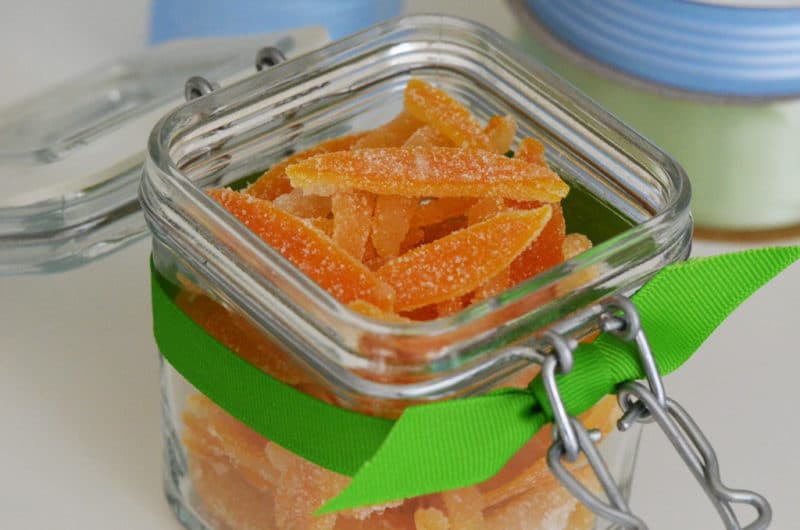
When my mother moved out of the home she lived in for 40 years, the home where she raised five children, a husband, many vegetable and flower gardens, and 50 pine trees, there was plenty of accumulated stuff to sort through. It was the stuff of photos, books, kitchen and china cabinets, closets, and more books.
Mom has never considered herself a saver, but save she did, an array of rather impressive booty. None of it would I call “fluff,” which could certainly label the boxes (12 of them to be exact) of my own archives that had resided in the furnace room downstairs for a lot of years. When I put them down there, it was just going to be for a short time when I moved to Chicago from Lansing. That short time ended up lasting 15 years.
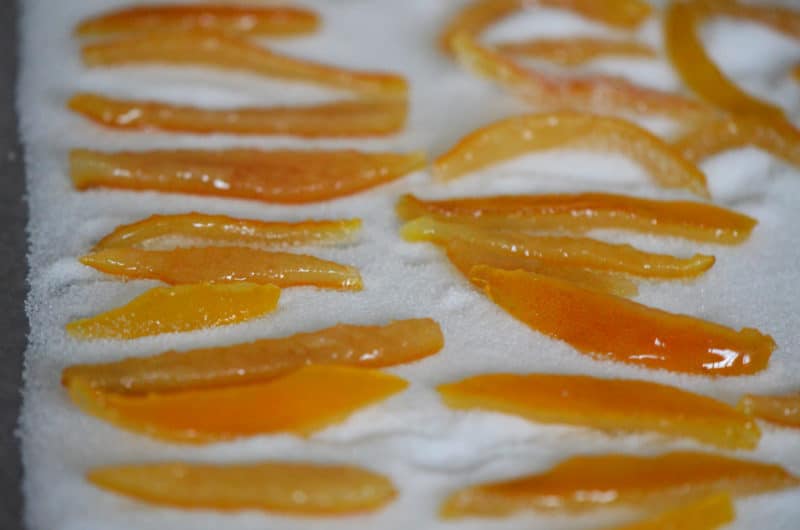
Funny how the things that seemed so important to save at the time were now just old things that could be gotten rid of with relatively little anguish. I sorted and I eliminated righteously, all along eyeing the boxes still down there of my siblings’ and laughing to myself that their day would come soon enough when they’d have to clear theirs out too. I shouldn’t refer to my eradication with such blasé, given that there was a box worth of items that could not be parted with—a few choice letters (my stash of letters from correspondences kept throughout my life is mountainous. I wonder if anyone on the receiving end saved any of mine?), some kitchen tools from Sitto’s house, a couple of the many papers I wrote.
My mother and I, just before I took flight for San Francisco last year, went from room to room in that big old house, purging and packing and purging and packing some more. We got so we’d stop here and there and reminisce, calling out to one another from opposite ends of the house if need be, and meeting the other one to see what treasure had been stumbled across and remembered.
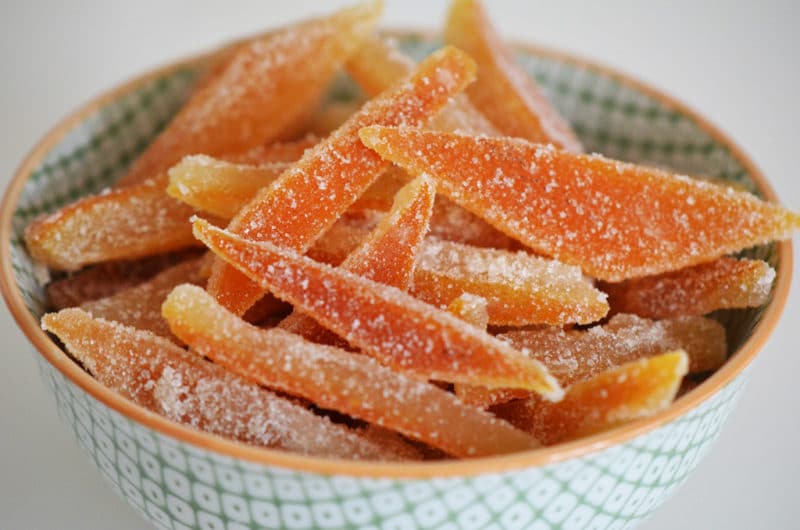
That included my father’s desk out in the sunroom, a massive walnut desk of a heft and shade that always reminds me of him whenever I see such a desk anywhere. The things on Dad’s desk were just as he had left them when he died ten years before: his black and gold name plate from his law office, a marble-based pen set, framed photos of my mother and the view of the bay from the bluff in Harbor Springs. There was a flat, leather-cornered desk calendar on the desk top still reading “June 2000.” His handwriting noted appointments early in the month. Later in the month I could see my own handwriting, and my mother’s, noting phone numbers and other information about the funeral or the cemetery. My mother and I hovered over the desk and had a good cry. The desk calendar with the month of June 2000 still attached was saved and placed back on his desk right where it belongs, in the new house across town.
Nearby was the set of books from Encyclopedia Britannica, which must have been purchased from the get-go because I don’t recall a time when it wasn’t there. The books looked beautiful on the shelf, even though they were dated and hadn’t been pulled down in ages. There was one book in particular that had been my favorite, and that was the letter “C.” I turned to it over and over again for its pages about candy, which I gravitated to in my childhood frenzy for photos of any kind depicting sweets. The book showed ribbons of taffy and jewel-toned candied fruits. Eventually I turned the pages in the book to discover there was something other than candy to read about, topics like communism and calligraphy. But those just didn’t hold my attention in quite the same way.
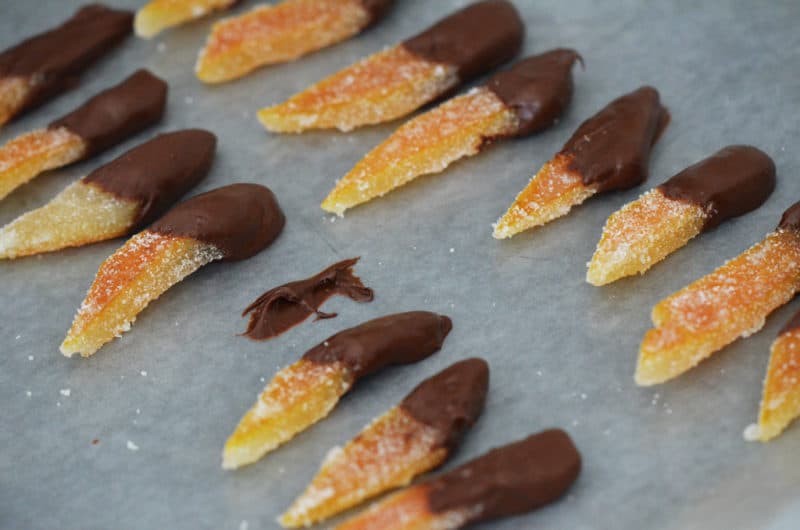
I suspected there would be little persuading my mother to keep the encyclopedias. I called out to her in my excitement to show her the book of “C.” Needless to say, we didn’t hover over it and have a good cry. She told me flat out that the set was going unless I wanted to haul it to San Francisco with me (she knew I was traveling bare-bones, with practically just my knives and a toothbrush)—and that the set would remain a set. In other words, I could not keep the “C” book for my own nostalgic (and at that point, future) bookshelf.
Letting go of the book of “C,” of the boxes and the house itself, and then heading west to culinary school to let go of still more of my past, turned out to be far less about loss and much more about making room for something new, such as not just childhood dreaming about ribbons of taffy and candied fruit, but growing up and deciding to actually learn how to make them.
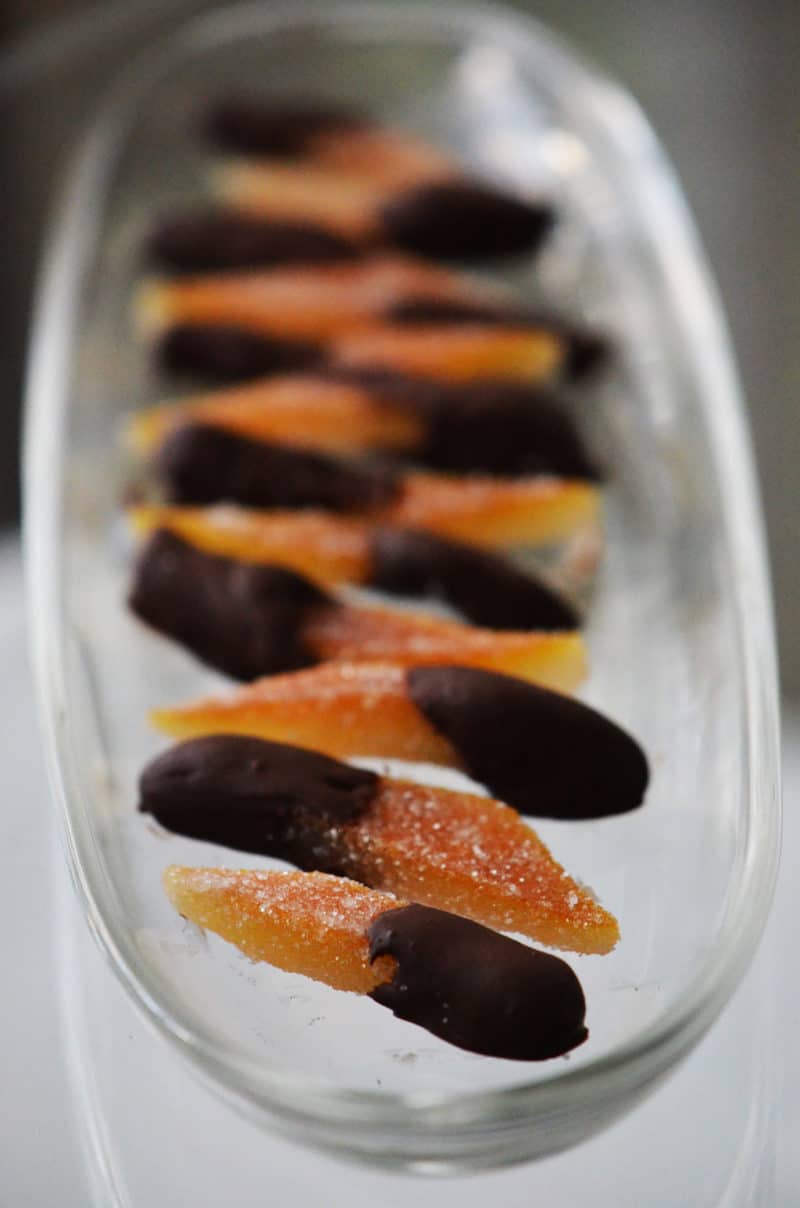
Candied Orange Peel, or Orangettes
Candied peel takes two basic steps: blanching, then simmering in sugar syrup. We’ve washed parsley three times, chilled cookie dough three times, and now we’re going to blanch citrus peels three times. The triple blanching is essential to extracting the bitterness from the peel and tenderizing it.
Candied peel is exceptional dipped in dark chocolate—we’re not tempering the chocolate here, just melting it for dipping, which means the dipped candy should then be refrigerated to harden the chocolate and prevent a bloomy white surface from forming (still very edible, just not pretty). Dip the peels in chocolate the day you are going to eat them. It’s best not to use the chocolate chips you’d use for cookies. They have stabilizers in them that prevent them from fully melting. I used them the day I made the dipped peel for you, and it made for a very thick coating of chocolate that was difficult to dip into.
Keep your candied peels in an airtight container (or ziplock bag) stored in the refrigerator. They make a lovely gift in a small clear bag or glass container, tied with a ribbon.
3 organic navel or Valencia oranges or 6 clementines
4 cups sugar (2 cups for syrup, 2 cups for coating the candy)
3 tablespoons light corn syrup
3 oz. semi-sweet chocolate (preferably not chocolate chips), optional
Wash and dry the oranges. Score them in quarters from stem to navel and peel. Slice the quarters into ½ inch lengths. Cut the slices in half crosswise, on the bias.
Place the peels in a large saucepan and cover with cold water. Bring to a boil over high heat and blanch for two minutes. Drain the peels and repeat this process two more times using fresh cold water each time—this is key.
After the third blanching, leave the peels in a colander while you make the sugar syrup in the same saucepan you’ve blanched in.
Combine 2 cups of the sugar, 3 tablespoons of corn syrup, and 1 cup of water in your saucepan and bring to a boil over high heat. Don’t agitate or stir the syrup at this stage—that can introduce crystallization into the mixture.
Add the peels to the syrup and reduce the heat to medium low. Simmer the peels until they are completely translucent, 60-90 minutes, stirring occasionally.
Drain the peels in a colander, reserving the orange-infused syrup if you like. It’s delicious stirred into tea or even just ice water.
The peels are hot, so be careful with the next step.
Line a sheet pan with waxed paper. Spread 2 cups of sugar evenly over the waxed paper. Using tongs, or your fingers if the peels have cooled a bit, lay the peels on the sugar to cool. Be sure to separate the peels so they are not touching each other, or else they will stick together.
Let the peels cool and dry, resting there on the sugar, for 3-4 hours. Then toss them in the sugar to coat. Knock off any excess sugar or any clumps that may have formed while they were cooling.
Place in an airtight container and refrigerate. Peels will keep for at least a month this way.
To dip the peels in chocolate, finely chop and melt the chocolate. You can melt the chocolate in a small bowl placed into or over a bain marie (a pan of water that’s been brought to a boil and turned off). Just be careful not to get any water into the chocolate. Or, melt the chocolate in the microwave using 30-second intervals and stirring as you go.
Dip the peel halfway into the smooth, melted chocolate and place on another sheet pan lined with waxed paper. Refrigerate until firm, and eat them the same day.
Find a PDF of this recipe here.
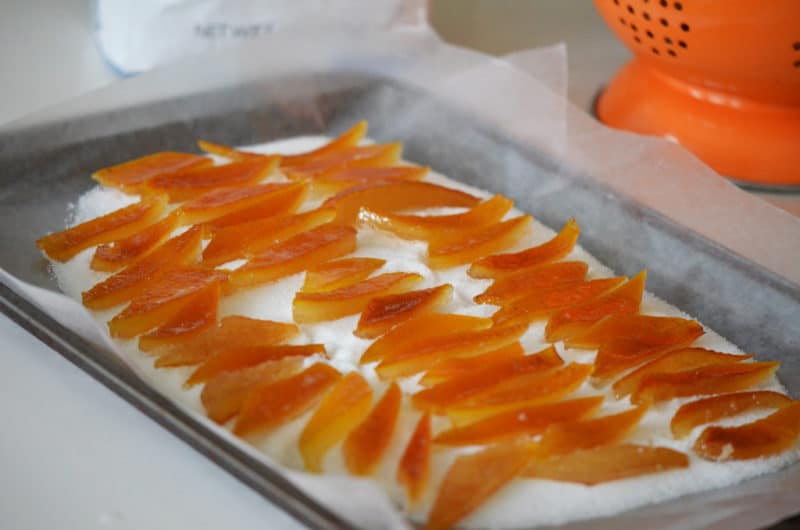
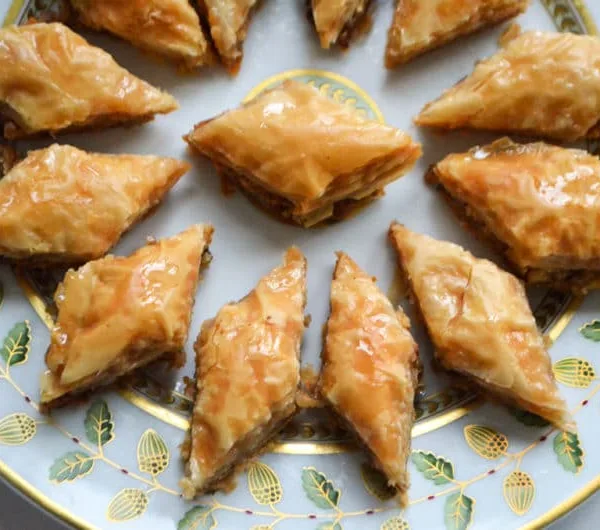


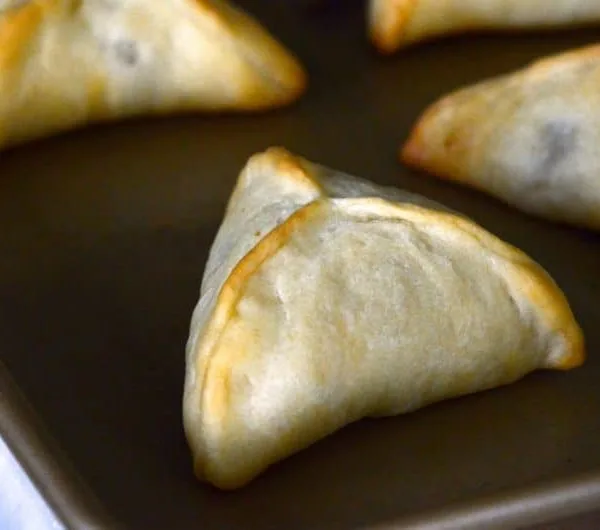







Hi Maureen, I tried a candied orange peel recipe several years ago. They turned out OK but the color was not as vivid as yours. I love this sweet treat. It reminds me of winter holidays from long ago. Thank you for sharing your version.
Oh how great Sarah! I hope your next batch turns out bright and beautiful. Such a treat!
love your stories, love your recipes! Many thanks for sharing your life with us.
How kind, thank you so much Mary.
Oops! Hit send to soon! I make stuffed squash, too. I’ve never made the sweets – passed down from both of my Sittos – and Jiddos, as well. (My mother wasn’t the best of cooks – God rest her soul! )Here’s hoping and praying my attempt is a success – when my siblings and families gather for our traditional Christmas Even celebration this year!
How special Mimi! Your dishes are going to be wonderful! Let me know how it goes, and thanks for taking time to write!
I’ve had so much fun reading and printing your Christmas Recipes! It’s made me want to get in the kitchen right now and “attemtp” to make all of them over the next 2 weeks! High hopes, I might add. I make kibbi, Lebanese rice, mjedra, stuffed squa
another lovely, telling story maureen. love love reading them every day.
Ah, yes, a handful of your letters are in my treasure trove!
How nice….
Hi Maureen,
What a beautiful story as always! Your descripton of the Encyclopedia Brittanica made me suddenly remember my favorite subjects to read over and over (giraffe, waterfall, anaconda, stalactite, constellation – I fancied myself a future explorer) – it was a lovely memory that I haven’t visited in many years. Thank you! Two questions – could honey or something else be substituted for the corn syrup and if I wanted to try grapefruit peels would I just shorten the blancing time due to the thinner skin?
Thank you Robin, and how great that you have an encyclopedia memory too. Turns out you did become a kind of explorer, no?! The corn syrup is there to assist in preventing crystallization and to help hold back the sweet factor a bit; I don’t think honey has the same properties and it would also lend a different, though not bad, flavor. Many recipes leave the corn syrup out altogether, so you can omit it without much problem. Just take care when you are boiling the sugar that it’s not agitated. The blanching time need not be shortened by much; even when I did thinner peels like clementine, I still blanched three times for two minutes. The time it takes for the thinner peel to candy in the syrup will be shorter though.
Have you ever used sour or bitter oranges with this technique?
Hi Sonja–I haven’t tried to candy sour or bitter oranges…very curious about it though. If you do try it, please let me know how they come out!
You write the most beautiful stories of your life……….I remember that big desk in the sunroom and having some great talks with you there. I sure miss your Dad; he was a wonderful, kind man.
A hug to you, cousin.
Question for you, Maureen: You said to only dip them in chocolate the day you eat them, but what about if you’re giving them as a gift? Will they hold up well for the recipient if you’ve made them a day or two before you gift them?
Hi SP–the chocolate will be kind of fudgy and should be kept refrigerated. It can be done in advance, a day or two as you say, just keep it cold and let the recipient know to keep it refrigerated. Otherwise you’ve got to temper the chocolate so it looks nice and has the right texture at room temperature.
Thanks, Maureen. I think I’ll stick to chocolate-less versions for the gifts.
Good plan–I think they are easier for gift-giving that way.